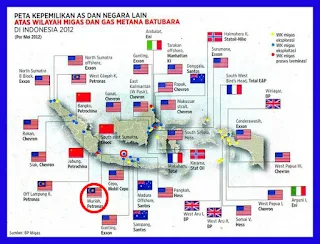State-owned gas firm PGN has asserted that Malaysian energy firm Petronas is still obliged to pay for contracted gas transportation through the Kalimantan-Java (Kalija) I pipeline, despite the force majeure declared at the Kepodang field operated by Petronas in Jepara, Central Java.
The Upstream Oil and Gas Regulatory Special Task Force (SKK-Migas) recently announced force majeure at the Kepodang field in the Muriah block, which is projected to run out of gas reserves in 2018, nine years earlier than previously estimated.
Muriah Block-Petronas
“The force majeure status only applies to the gas sales agreement, not for the transportation agreement,” PGN chief financial officer Nusantara Suyono told The Jakarta Post on Tuesday. “As there is a ship-or-pay clause in the transportation agreement, Petronas will still have to pay even though there is no gas to be transported from the Kepodang field.”
Petronas previously signed a gas sales agreement with state electricity firm PLN, in which the former committed to supplying 116 million standard cubic feet per day (mmscfd) of gas produced at Kepodang field within a 12-year period from 2015 for the latter’s 1,000 megawatt (MW) Tambak Lorok combined-cycle power plant (PLTGU) in Semarang, Central Java.
In relation to the gas transmission, the Malaysia-based energy firm sealed an additional agreement With PT Kalimantan Jawa Gas (KJG) a joint venture between PGN and investment company PT Bakrie & Brothers, with 80 percent and 20 percent ownership, respectively.
KJG is obliged to transmit the gas through the Kalija I pipeline, which costs US$266.75 million and spans 201 kilometers from the Kepodang field to the Tambak Lorok facility, with a fee of $2,236 per thousand standard cubic feet (mscf) of gas for the 12-year period.
Previously PLN strategic procurement director Supangkat Iwan Santoso stated the company would probably prefer to terminate its gas sales agreement with Petronas although the latter tried approaching it to replace the gas supply from other sources.
Moreover, he said the gas price from the Kepodang field was too high, at $4.61 per million British' thermal units (mmbtu) with an escalation of 8.6 percent a year.
“The escalation is too high. Now, the price has reached $7 per mmbtu at our Tambak Lorok plant and will surpass $10 within the next iive years,” Iwan said.
Hence, PLN is considering alternative sources of energy for its Tambak Lorok facility, perhaps even liquefied natural gas (LNG). The company also still has gas supplier amounting to 46 mmscfd from the Gundih gas block in Blora, Central Java, which is operated by Pertamina EP the upstream subsidiary of state-owned energy giant Pertamina.
Meanwhile, Petronas has stated that it will still supply gas to PLN until 2018, even though the capacity might only reach 70 mmscfd. The unexpected force majeure at Kepodang has also affected PGN, which owns 20 percent of the field through its upstream subsidiary PT Saka Energi Indonesia. ‘As force majeure has been declared, we have to record it as an impairment loss,” Nusantara said.
Within the first six months of 2017, PGN could only distribute 749 mmscfd and transmit 721 mmscfd of gas, seeing an annual decrease of 5.9 percent and 11.6 percent, respectively; as a result of slower demand amid a sluggish economy.
At the same time, the company was also hit by the governments decision to cut end-user gas prices to below $6 per mmbtu for the petrochemical, fertilizer and steel industries at the beginning of this year.
As a result, PGN’s net revenues fell by 1.95 percent to $1.4 billion, While its net profits plunged even further by 67 percent to $ 50.3 million. In July, PGN had squared syndicated loans worth $650 million it received from five different financial institutions in 2014, two years ahead of their maturity date of 2019 after the firm decided to delay expansion plans following the declining financial performance.
The syndicated loans came from ANZ Banking Group, the Bank of Tokyo-Mitsubishi URL Citigroup Global Markets Singapore, the Hongkong and Shanghai Banking Corporation, and Sumitomo Mitsui Banking Corporation.
Jakarta Post, Page-18, Thursday, Sept 7, 2017



No comments:
Post a Comment